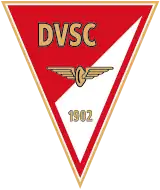 | |||
| Full name | Debreceni Vasutas Sport Club | ||
|---|---|---|---|
| Nickname(s) | Loki | ||
| Short name | DVSC | ||
| Founded | 12 March 1902 | ||
| Ground | Nagyerdei Stadion | ||
| Capacity | 20,340 | ||
| Chairman | Ike Thierry Zaengel | ||
| Manager | Srđan Blagojević | ||
| League | NB I | ||
| 2022–23 | NBI, 3rd of 12 | ||
| Website | Club website | ||
|
| |||
Debreceni Vasutas Sport Club is a Hungarian professional football club, based in Debrecen, that competes in the Nemzeti Bajnokság I, the first tier of Hungarian football.[1] They are best known internationally for reaching the group stages of the UEFA Champions League in the 2009–10 season.[2] Debrecen have become the most successful club in Hungary since 2000, winning the Hungarian League seven times.[3]
History
Debrecen was founded on 12 March 1902 as Debreceni Vasutas Sport Club.[4] The club first reached the Nemzeti Bajnokság I in the 1943–44 season. Debrecen rose to domestic prominence in the early 2000s when they won their first Hungarian league title in 2004–05 season. Since then the club managed to win seven titles in the 2010s total. However, in the late 2010s the club lost its governmental support and started to decline. In the 2016–17 Nemzeti Bajnokság I, they were escaping from relegation.
At international level, Debrecen reached their biggest success when they managed to reach the 2009–10 UEFA Champions League group stage.[5] The following year they reached the group stages of the 2010–11 UEFA Europa League.[6]
Crest and colours
Naming history
- 1902–12: Egyetértés Football Club
- 1912–48: Debreceni Vasutas
- 1948–49: Debreceni Vasutas Sport Egyesület
- 1949–55: Debreceni Lokomotív
- 1955–56: Debreceni Törekvés
- 1957–79: Debreceni Vasutas Sport Club
- 1979–89: Debreceni Munkás Vasutas Sport Club
- 1989–95: Debreceni Vasutas Sport Club
- 1995–99: DVSC-Epona
- 1999–01: Debreceni VSC
- 2001–02: Netforum-DVSC
- 2002: Debreceni VSC
- 2003–05: DVSC-MegaForce
- 2005–06: DVSC-AVE Ásványvíz
- 2006–16: DVSC-TEVA
- 2016–: Debreceni Vasutas Sport Club
Manufacturers and shirt sponsors
The following table shows in detail Debreceni VSC kit manufacturers and shirt sponsors by year:
| Period | Kit manufacturer | Shirt sponsor |
|---|---|---|
| 1977– | adidas | |
| 1993–1995 | paletta | |
| −2000 | Epona | |
| 2000–2001 | Soproni Ászok | |
| 2001–2002 | — | |
| 2002–2003 | Arany Ászok | |
| 2003–2004 | Nike | MegaForce / Arany Ászok |
| 2005 | adidas | Ave Ásványvíz / Arany Ászok |
| 2005–2006 | Ave Ásványvíz / | |
| 2006–2007 | Teva / Ave Ásványvíz | |
| 2008–2009 | Teva | |
| 2009–2010 | Orangeways / Teva | |
| 2010–2016 | Teva |
Stadiums and facilities

Debrecen played their home matches between 1989 and 2014 at the Oláh Gábor utcai Stadion, which has a capacity of 12,500. After winning the first Nemzeti Bajnokság I trophy, it was found that the stadium did not meet UEFA stadium criteria. Therefore, the most important UEFA Champions League and UEFA Europa League matches had to be played at the Ferenc Puskás Stadium as in 2009–10 UEFA Champions League group stage and the 2010–11 UEFA Europa League group stage.
On 1 May 2014, the Nagyerdei stadium was opened with an inauguration ceremony. Viktor Orbán, Hungarian prime minister, said that "the Hungarian spirit, the architects, the engineers, the workers make Hungary great again with this constructions like the Nagyerdei stadium" (in Hungarian: "A magyar szellem, a tervezők, a mérnökök, a munkások ilyen alkotásokkal teszik ismét naggyá Magyarországot"). The stadium was also sanctified by Nándor Bosák, bishop of the Roman Catholic Church, Gusztáv Bölcskei, minister, and Fülöp Kocsis, bishops of the Greek Catholic Church. After the sanctification, singers such as Lou Bega, Viktor Király, Ildikó Kersztes, Gigi Radić, and Erika Miklósa entertained the audience. The first match was played between the Debrecen All Stars and Hungary All Stars, including players such as Attila Pintér, current Hungary national football team coach, Kálmán Kovács, former Budapest Honvéd legend, Péter Lipcsei, former Ferencváros icon, György Véber, former Újpest icon and Mezőkövesd manager at that time, Imre Garaba, former Hungary international, Flórián Urbán, former Újpest legend, and Lajos Détári, former Hungary national team legend.[7]
On 10 May 2014, the first official match was played at the new stadium between Debrecen and Újpest in the 2013–14 Hungarian League season. The match ended with a 3–1 victory over the Budapest-based rival, Újpest. The first goal of the match was scored by Kulcsár in the 27th minute. Although Vasiljević equalised the score in the 37th minute, Debrecen were able to clinch the victory in the second half due to an own goal by Antón in the 46-minute and a goal by Vadnai in the 85th minute.[8][9]
On 22 May 2014, the first match of the Hungary national football team was played at the stadium in front of 20,000 spectators, which ended with a 2–2 draw against Denmark national football team. The first goal was scored by the former Debrecen player Dzsudzsák. Eriksen equalised the score in the 56th minute. The debutant Varga took the lead in the 69th minute again, but the score was equalised by Schöne in the 72nd minute.[10][11][12]
Supporters
Supporters of DVSC are mainly based in Debrecen, Hungary. However, the club is popular in all over Hungary. Club's main ultras group is Szívtiprók Ultras Debrecen (SZ.U.D.), which is the largest and oldest faction, founded in 1994.[13] As of 2000, SZ.U.D started to divide itself, in factions of ultras outside Debrecen, such as SZ.U.D. Budapest, SZ.U.D. Nagyvárad and SZ.U.D. Hódmezővásárhely. Among smaller groups are considered Force Field, Red Territory and Vadmacskák, which are the oldest. However, since 2009, new ultras factions, such as Sziporkák, Debrecen Hooligans, Barrabrava Debrecen and others appeared. This while several, like North Side Hooligans were dissolved in early 2000s. Debrecen has fierce rivalries with Nyíregyháza, Békéscsaba and competitive rivalries with Ferencváros, Újpest and Videoton.
On 5 August 2014, UEFA issued sanctions against Debrecen, Romania's Steaua București and Slovenia's Maribor following racist behaviour by their fans during 2014–15 UEFA Champions League qualifying against Cliftonville, Strømsgodset and Zrinjski Mostar respectively. Debrecen shut sector B of their ground after fans showed an "illicit banner" during the match against Northern Ireland's Cliftonville.[14]
- Szívtiprók Ultras Debrecen (founded in 1994)
- Famous supporters
Ownership
On 27 May 2017, it was announced that Andy Vajna could replace Gábor Szima as the owner of Debrecen. Nevertheless, Andy Vajna added that he likes football but he does not want to invest into football.[16]
On 15 August 2017, it was revealed that Gábor Szima, the owner of Debrecen, might leave the club and a Greek tycoon might arrive.[17]
On 1 July 2020, Szima resigned as the owner of the club.[18] The 73 percent of the shares of the club were purchased by the local government. László Papp, mayor of Debrecen, announced that the main goal is to be promoted to the first league again.
On 18 December 2020, it was announced that the DVSC Egyesület purchased the majority of the shares.[19]
On 27 June 2022, Ike Thierry Zaengel was appointed as the chairman and owner of the club.[20]
Honours
Domestic
- Nemzeti Bajnokság I
- Nemzeti Bajnokság II
- Winners (8): 1942–43, 1948–49, 1959–60, 1961–62, 1978–79, 1988–89, 1992–93, 2020–21
- Runners-up (1): 1983–84
- Magyar Kupa
- Ligakupa
- Winners (1): 2009–10
- Szuperkupa
Record departures
| Rank | Player | To | Fee | Year | Ref. |
|---|---|---|---|---|---|
| 1. | €2.5 million[upper-alpha 1] | 2008 | |||
| 2. | €2.2 million[upper-alpha 2] | 2016 | |||
| 3. | ~€850,000 | 2020 | |||
| 4. | ~€830,000 | 2011 | |||
| 5. | ~€700,000 | 2018 | |||
| 6. | ~€600,000 | 2007 | |||
| 7. | ~€575,000 | 2007 | |||
| 8. | ~€550,000 | 2009 | |||
| 8. | ~€550,000 | 2017 | |||
| 8. | ~€550,000 | 2023 | |||
| 9. | ~€500,000 | 2006 | |||
| 9. | ~€500,000 | 2017 | |||
| 10. | ~€400,000 | 2007 | |||
| 10. | ~€400,000 | 2019 |
Players
Current squad
- As of 1 September 2023.[21]
Note: Flags indicate national team as defined under FIFA eligibility rules. Players may hold more than one non-FIFA nationality.
|
|
Players with multiple nationalities
Out on loan
Note: Flags indicate national team as defined under FIFA eligibility rules. Players may hold more than one non-FIFA nationality.
|
B squad
|
|
Club officials
Board of directors
As of 27 December 2022[22]
| Position | Name |
|---|---|
| President | |
| Managing Director | |
| Sporting director |
Management
As of 24 July 2023[23]
| Position | Name |
|---|---|
| Head coach | |
| Assistant coach | |
| Assistant coach | |
| Assistant coach | |
| Goalkeeping coach | |
| Video analyst | |
Notable foreign players
 Stevo Nikolić
Stevo Nikolić Haris Handžić
Haris Handžić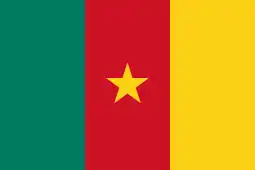 Dorge Kouemaha
Dorge Kouemaha Yannick Mbengono
Yannick Mbengono Justin Mengolo
Justin Mengolo Sandro Tomić
Sandro Tomić Ronald Habi
Ronald Habi Božidar Radošević
Božidar Radošević Dajan Šimac
Dajan Šimac Igor Morozov
Igor Morozov Adamo Coulibaly
Adamo Coulibaly Selim Bouadla
Selim Bouadla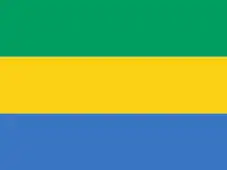 Roguy Méyé
Roguy Méyé Kakhaber Chkhetiani
Kakhaber Chkhetiani Luis Ramos
Luis Ramos Mindaugas Malinauskas
Mindaugas Malinauskas Aco Stojkov
Aco Stojkov David Babunski
David Babunski Dorian Babunski
Dorian Babunski Mirsad Mijadinoski
Mirsad Mijadinoski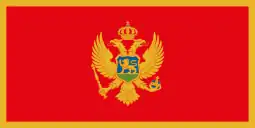 Bojan Brnović
Bojan Brnović Vukašin Poleksić
Vukašin Poleksić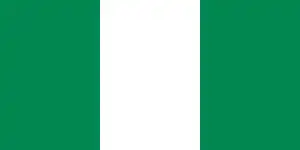 Tunde Adeniji
Tunde Adeniji Liviu Goian
Liviu Goian Tibor Selymes
Tibor Selymes Nicolae Ilea
Nicolae Ilea Marius Șumudică
Marius Șumudică Sabin Ilie
Sabin Ilie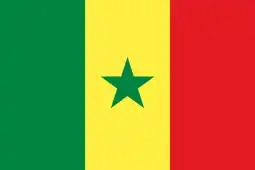 Ibrahima Sidibe
Ibrahima Sidibe Igor Bogdanović
Igor Bogdanović Dragan Vukmir
Dragan Vukmir Nenad Novaković
Nenad Novaković Dušan Brković
Dušan Brković Róbert Vittek
Róbert Vittek Dalibor Volaš
Dalibor Volaš Rene Mihelič
Rene Mihelič Suk Hyun-jun
Suk Hyun-jun.svg.png.webp) Haris Tabakovic
Haris Tabakovic Ivan Bobko
Ivan Bobko Frank Feltscher
Frank Feltscher
See also
Notes
References
- ↑ "Debreceni VSC". UEFA. 15 July 2014.
- ↑ "2009–10 UEFA Champions League: Clubs". UEFA. 15 July 2014.
- ↑ "Hungarian League winners". The Rec Sport Soccer Statistics Foundation. 15 July 2014.
- ↑ "This is Debrecen | Hungarian Football". HungarianFootball.com. 3 October 2010. Retrieved 12 October 2021.
- ↑ "Debreceni VSC | Hungarian Football". HungarianFootball.com. Retrieved 12 October 2021.
- ↑ "2010-2011 Debrecen Stats, Europa League". FBref.com. Retrieved 14 October 2021.
- ↑ "DVSC: átadták a vadonatúj Nagyerdei Stadiont – fotók". nso.hu. 1 May 2014.
- ↑ "Matematikailag nem, gyakorlatilag viszont már bajnok lehet a Loki". nso.hu. 9 May 2014.
- ↑ "DVSC: Loki-fieszta az új stadion nyitányán – képek". nso.hu. 10 May 2014.
- ↑ "Kétszer is vezettünk a dánok ellen, szép gólok után a vége iksz". nso.hu. 22 May 2014.
- ↑ "Válogatott: a dánok szerint gyenge csapattal ikszeltek – lapszemle". nso.hu. 22 May 2014.
- ↑ "A mosdóban volt meleg víz, és egy órát még futballoztunk is!". nso.hu. 22 May 2014.
- ↑ "Szívtiprók Ultras Debrecen". szud94.hu. 3 August 2015.
- ↑ UEFA closes stands at Steaua, Debrecen and Maribor after racist incidents, The Guardian, 5 August 2015
- ↑ "Lukács László – benne a vér, piros-fehér". Presztizs.com. 22 October 2014.
- ↑ "DVSC: Andy Vajna cáfolja, hogy ő lesz az új tulajdonos" [DVSC: Any Vajna repudiates that he might be the next owner] (in Hungarian). Nemzetisport.hu. 27 May 2017. Retrieved 15 August 2017.
- ↑ "DVSC: Szima Gábor távozhat, görög hajómágnás jöhet" [DVSC: Gábor Szima might leave, Greek tycoon can come] (in Hungarian). Nemzetisport.hu. 15 August 2017. Retrieved 15 August 2017.
- ↑ "DVSC: Nagy bejelentés a debreceni futballklub jövőjéről – NSO".
- ↑ "Megtörtént a tulajdonosváltás a debreceni futballcsapatnál". 18 December 2020.
- ↑ I, P. (27 June 2022). "DVSC: bemutatták az új vezetőedzőt és tulajdonosi kört - NSO". NSO.hu (in Hungarian). Retrieved 27 June 2022.
- ↑ "Debrecen". dvsc.hu. Retrieved 1 September 2023.
- ↑ "Menedzsment Archívum". DVSC Futball Zrt. (in Hungarian). Retrieved 27 December 2022.
- ↑ "Edzői team Archívum". DVSC Futball Zrt. (in Hungarian). Retrieved 24 July 2023.
External links
- Official website (in Hungarian)
- Debreceni VSC on Facebook
- Detailed international match archive (in English)
- Debreceni VSC Forum (in English)
- Debrecen City – Dombi Tibi elemzés (in Hungarian)